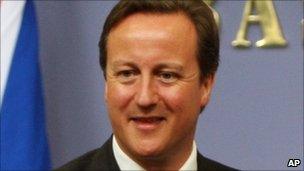David Cameron arrives in India on trade drive
- Published

Mr Cameron wants to give more attention to Anglo-Indian relations
David Cameron has arrived in India for a visit he hopes will inject new energy into Anglo-Indian relations and help build trade links between the nations.
The prime minister, on his first visit to Asia since taking office, is being accompanied by several senior Cabinet colleagues and UK business leaders.
The government regards India as a vital regional and economic partner in the drive to boost exports and investment.
Mr Cameron travelled from Turkey where he pledged to help its EU entry bid.
Since taking office, the coalition has stressed the need to place economic co-operation and trade development at the heart of its foreign policy, with increased focus on fast-growing economies in Asia and Latin America.
Ministers have suggested relations with Commonwealth countries and emerging economic powers were allowed to languish under Labour.
Among those travelling to India with Mr Cameron are Chancellor George Osborne, Foreign Secretary William Hague and Business Secretary Vince Cable.
Economic benefits
They flew into Bangalore, where many leading British firms have offices, and will spread out across the country over the next couple of days.
The bosses of Barclays, Vodafone, SAB Miller and the English Premier League are among a sizeable business delegation while leading academics and sporting figures - including 2012 Olympics chairman Lord Coe - have also made the trip.
As well as making the case for increased two-way investment, Mr Cameron is expected to discuss foreign policy and security goals with Indian leaders focusing on joint counter-terrorism initiatives and support for Afghanistan and Pakistan.
Mr Cameron visited India in 2006, in his first year as opposition leader.
Ahead of a series of meetings on Wednesday, Mr Cable said he hoped to negotiate a series of agreements and partnerships spanning higher education, science, infrastructure and the creative industries.
"The trade and investment relationship our two countries already have is good but the government has much higher ambitions," he said.
"During this visit, we want to lay the foundations for a stronger, more successful relationship. The potential benefits are numerous for both India and ourselves."
Immigration concerns
However, Mr Cable attracted attention after telling the Indian media that he wanted the UK to have "as liberal an immigration policy as it is possible to have".
Indian firms have expressed concerns about UK government plans to introduce an annual cap on migrants from outside the EU entering the country - a policy that the Lib Dems signed up to in the coalition agreement.
Mr Cable said different departments were debating "how we create the most flexible regime we can possibly have but in a way that reassures the British people".
The BBC's Laura Kuenssberg, who is travelling with the prime minister, said Indian ministers had already dropped heavy hints at their unhappiness with the proposed permanent cap - which follows a temporary cap implemented last month.
Our correspondent said she expected Mr Cameron to be pressed on the potential contradiction between arguing for the UK to attract more talented Indian professionals but restricting immigration at the same time.
A Downing Street spokeswoman said the Home Office has made it "very clear" it wanted to see net annual migration fall from hundreds of thousands in recent years to tens of thousands.
- Published27 July 2010
- Published27 July 2010